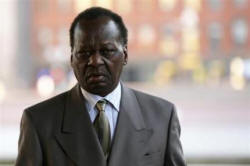|
 White
House reverses, says Obama met uncle and lived with him during law
school White
House reverses, says Obama met uncle and lived with him during law
school
 Send a link to a friend
Send a link to a friend
[December 06, 2013]
By
Jeff Mason
WASHINGTON (Reuters) — President Barack
Obama lived briefly with his Kenyan-born uncle while attending law
school, the White House said on Thursday, reversing earlier statements
that there was no record of the two men ever having met.
|
|
 White House spokesman Jay Carney said he clarified the issue with
the president directly after reports that Onyango Obama, who faced
deportation from the United States, said he had housed his nephew
temporarily. White House spokesman Jay Carney said he clarified the issue with
the president directly after reports that Onyango Obama, who faced
deportation from the United States, said he had housed his nephew
temporarily.
A U.S. immigration judged ruled on Tuesday that the 69-year-old half
brother of the president's late father could stay as a lawful U.S.
resident despite decades dodging deportation and a 2011
drunken-driving arrest.
Barack Obama attended Harvard Law School in Cambridge,
Massachusetts, in the late 1980s.
Carney said White House press staff had consulted the president's
book for evidence of a meeting between the two men when the issue
came up previously, but no one had posed the question to the
commander in chief.

"Nobody had asked him in the past, and the president said that he in
fact had met Omar Obama when he moved to Cambridge for law school
and that he stayed with him for a brief period of time until his,
the president's, apartment was ready," Carney told reporters.
"After that, they saw each other once every few months while the
president was in Cambridge, and then after law school they gradually
fell out of touch."
[to top of second column] |

Obama had not seen his uncle in 20 years or spoken to him in roughly
10 years, Carney said.
Onyango Obama came to the United States as a teenager in 1963 to
attend an elite school near Boston, but allowed his visa status to
lapse in 1970. He was denied green-card status in the 1980s and was
asked to leave the country. But he did not do so.
The immigration judge said he based his decision to allow him to
stay on a federal law granting green cards to foreigners who arrived
in the United States before 1972 as long as they were found to be of
good moral character.
Carney said there was "absolutely zero interference" from the White
House in the president's uncle's case.
(Additional reporting by Richard Valdmanis;
editing by Peter Cooney)

|